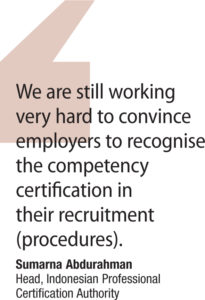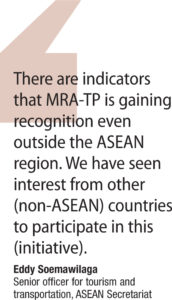ASEAN has been long been plagued by non-conformity of standards in many areas, so will the MRA-TP set a new benchmark for standardisation of skills in the regional tourism sector? Mimi Hudoyo investigates

Over a decade in the making, the Mutual Recognition Arrangement of Tourism Professionals (MRA-TP) is finally up and running, achieved through a supporting infrastructure that is touted to step up the game for the standardisation of skills in the region’s tourism industry.
Under the MRA-TP, ASEAN has developed benchmarking standards for 32 job types in six labour divisions – namely front office, housekeeping and F&B services in hotels, as well as tour operations, food production and travel agencies – initiated 52 qualifications and 242 training toolboxes.
Eddy Soemawilaga, senior officer for tourism and transportation, ASEAN Secretariat, commented: “(The implementation of) MRA-TP started in 2012 (but) what we did not have then was the registration platform. With the launch of ASEAN Tourism Professional Registration System (ATPRS) we now have a complete infrastructure to support the running of MRA-TP, although this is still a work in progress.”
Launched during the recent international conference on MRA-TP in Jakarta in August, the ATPRS was first conceived to support the MRA-TP’s goals to increase certification among tourism professionals and facilitate their free movement and employment among ASEAN member countries.
One key component of the web-based facility is to serve as a job-matching platform for tourism professionals and industry stakeholders in ASEAN. The platform also seeks to register and disseminate details of certified tourism professionals, provide and facilitate training programmes, develop a regional pool of trainers and assessors, and market and promote the MRA-TP, in addition to being a revenue source for the regional secretariat stationed in Jakarta.
A recognised criterion?
Despite its ratification by ASEAN member states, the actual adoption of MRA-TP on the ground is much more complicated, compounded by issues such as a paucity of tourism schools in some countries, a lack of awareness among employers and tourism professionals on the importance and benefits of certification, as well as certification costs which are prohibitive for some industry players.
For example, Cambodia’s burgeoning tourism sector accounted for 620,000 jobs in 2015 but only 20 per cent of the tourism workforce graduated from tourism universities and schools. It is estimated that 63 per cent and 45 per cent of employees in the country’s hotels and travel services respectively are in need of training to meet the ASEAN standards.
Try Chivv, deputy director general of tourism and director of the National Committee for Tourism Professionals under the Ministry of Tourism Cambodia, said: “By 2020 we target to receive more than seven million arrivals (up from 4.7 million in 2015), and we will have 850 jobs (to fill). Having qualified tourism professionals is very important for us.”
Indonesia, on the other hand, sees the reluctance of stakeholders to participate in the certification despite the government’s mandatory ruling.
Sumarna Abdurahman, head of the Indonesian Professional Certification Authority (BNSP), said: “We are still working very hard to convince employers to recognise the competency certification in their recruitment (procedures).
“They are still questioning the effectiveness and quality of the certification and whether the certified applicants can perform according to their certification,” he said, adding that higher salary demand from prospective certified employees also weighs on employers’ concerns.

Alexander Nayoan, managing director of The Dharmawangsa Jakarta and chairman of the Jakarta Hotels Association, said the resistance also stems from a lack of understanding on the importance of certification. He said: “There are questions of ‘What is it for me?’ and ‘Why should I spend more?’ among tourism employers and professionals alike.”
Also showing disinterest are international branded hotels, which deem themselves to be having higher qualification standards than their national and regional counterparts, he shared.
And while the ATRPS is lauded as a critical tool in aiding the regional quest for common tourism skills standards, its by-registration operating model means that companies need to advertise their job openings through the platform while professionals need to indicate their interest in seeking jobs.
As such, the success of ATRPS is very much reliant on the regional secretariat’s ability to step up awareness among the ASEAN travel trade in order to maximise its potential, which according to Eddy will be automatically promoted to tourism professionals applying for accreditation to register themselves into the system.
“A (greater) challenge is getting tourism providers to join in. The conference was actually an invitation to the industry to buy in,” he said.
Eddy also acknowledges that the MRA-TP is still a work in progress. “ASEAN is the only region in the world with this practice, so we have no reference (for benchmarking). However, there are indicators that MRA-TP is gaining recognition even outside the ASEAN region. We have seen interest from other (non-ASEAN) countries to participate in this (initiative).”
Maria Susan Dela Rama, executive director of the Technical Education and Skills Development Authority, the certification office of the Philippines, confirmed that she has indeed received queries from several Middle Eastern countries on joining the MRA-TP.
Building up momentum
Individual ASEAN countries have devised their own strategies to overcome the challenges in the tourism sector.
Cambodia has defined 10 directives including launching apprenticeship programmes, promoting in-house training, setting up mobile tourism trainers and encouraging tourism study loans, among others.
Rising up to the challenge of grooming future hospitality talent is NagaWorld in Phnom Penh, which has established an intern programme to hire 1,000 interns in 2014 and more in the following years.
“It does not matter whether or not they will work for NagaWorld,” said NagaWorld’s managing director for corporate affairs Robert Choo, who shared that the company works with more than 35 industry partners to ensure jobs for all its intern graduates. “It is our CSR (contribution) to the country.
“MRA-TP provides opportunity for all hospitality professionals regardless of their economic or educational background. This is a game-changer in Cambodia as well as in many other countries,” he posited.

To overcome challenges hindering the implementation of the MRA-TP, NagaWorld and several other industry players in Cambodia have come together to leverage the online video and audio resources on NagaWorld’s website for national training efforts.
Indonesia, meanwhile, is considering the possibility of offering tax incentives or reducing cost to attract more participants to using MRA-TP, said Sumarna.
And with the millennials making up a significant portion of ASEAN’s tourism talent pool, the promotion of MRA-TP should adapt to the way they consume information, industry members pointed out.
Moving forward, trade members also called on expanding the categories of MRA-TP to cover other job areas such as MICE and spa & wellness.
Nayoan believes that the benchmarking standards should apply to all levels of the tourism industry instead of being confined to the front-end staff. “I think even owners should seek certification,” he remarked.
“Otherwise, how can you get the managers to be certified if owners themselves do not understand the importance and won’t spend money on it?” he questioned.
“What we need is (information and promotion) that will convince the industry how the MRA-TP can be truly beneficial,” Nayoan elaborated. “If implemented properly, it will actually increase profits for the industry and tax revenue for the government.”
This article was first published in TTG Asia October 2016 issue. To read more, please view our digital edition or click here to subscribe.




















